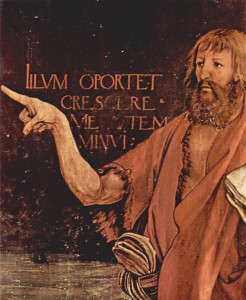
If Advent is new to you, I don’t blame you for feeling a bit confused. Advent as preparation for Christmas is a no-brainer. All these other things, like Jesus’ return, that are a part of Advent, can seem beside the point. But in the second week of Advent, a figure takes center stage who both completely makes sense and who stretches our brains: John the Baptist.
It makes sense to speak of John in Advent. John the Baptist is the one we know is coming to “prepare the way.” Listen to what the angel says to his father Zechariah:
But the angel said to him, “Do not be afraid, Zechariah, for your prayer has been heard. Your wife Elizabeth will bear you a son, and you will name him John. You will have joy and gladness, and many will rejoice at his birth, for he will be great in the sight of the Lord. He must never drink wine or strong drink; even before his birth he will be filled with the Holy Spirit. He will turn many of the people of Israel to the Lord their God. With the spirit and power of Elijah he will go before him, to turn the hearts of parents to their children, and the disobedient to the wisdom of the righteous, to make ready a people prepared for the Lord.” (Luke 1:13–17 (NRSV))
What really stretches us is what, or rather, who stands behind John:
See, I will send you the prophet Elijah before that great and dreadful day of the LORD comes. He will turn the hearts of the fathers to their children, and the hearts of the children to their fathers; or else I will come and strike the land with a curse. (Malachi 4:5–6 (NIV))
What are we to make of this? John isn’t just like Elijah. In some way he is Elijah! Jesus draws the connection very close:
Then [the disciples] asked [Jesus], “Why do the scribes say that Elijah must come first?” He said to them, “Elijah is indeed coming first to restore all things. How then is it written about the Son of Man, that he is to go through many sufferings and be treated with contempt? But I tell you that Elijah has come, and they did to him whatever they pleased, as it is written about him. (Mark 9:11–13 (NRSV))
Why should we care about John and his connection with Elijah? What does this have to do with Advent?
Speaking to Power
First, just like Elijah, John spoke to power. Elijah was not afraid to confront Ahab, the king of Israel (and behind him, Jezebel). The scene of Elijah confronting the prophets of Baal would make a great Hollywood movie! Likewise, John confronts Herod over his improper marriage relationship – and pays the price!
This Advent, we should ask, “In what ways are we called to speak to power?” And more to the point, are we willing to bear the consequences? (The phrase “Don’t lose your head” takes on a different meaning in reference to John the Baptist!) This is a very scary question in the context of the academy – degrees and tenure are on the line.
Experiencing Doubt

Second, both Elijah and John suffer doubt. Elijah, even in the wake of the great victory at Mt. Carmel, thinks he is all alone. John, thrown in prison, wonders if Jesus is “the one” and sends messengers to try and get an answer to his question about Jesus’ identity.
At this point it is worthwhile to point out that while there are many similarities between John and Elijah, they are also different. For Elijah, God reminds him that he is not alone, but for John, death is close at hand. We can take comfort (cold though it is) in the fact that even these two great prophets experienced darkness.
Next, consider what the link between Elijah and John means in terms of John’s status. He is a great prophet indeed! In fact, see what Jesus says about John:
What did you go out into the wilderness to look at? A reed shaken by the wind? What then did you go out to see? Someone dressed in soft robes? Look, those who wear soft robes are in royal palaces. What then did you go out to see? A prophet? Yes, I tell you, and more than a prophet. This is the one about whom it is written, “See, I am sending my messenger ahead of you, who will prepare your way before you.” Truly I tell you, among those born of women no one has arisen greater than John the Baptist;
Very high praise, but Jesus continues:
yet the least in the kingdom of heaven is greater than he. From the days of John the Baptist until now the kingdom of heaven has suffered violence, and the violent take it by force. For all the prophets and the law prophesied until John came; and if you are willing to accept it, he is Elijah who is to come. Let anyone with ears listen! (Matthew 11:7–15 (NRSV))
In this we see the contrast between two categories: the Kingdom of Heaven and that which is not the Kingdom, even the great “sign posts” (the Law and the prophets) pointing to the Kingdom. It is wrong to assume that all in the University lies in the category of “not Kingdom” (this is not the time to argue this point), but it is also a mistake if we don’t recognize that much of the academic world is not in line with the Kingdom of Heaven.
Decreasing, So That Jesus May Increase
Which leads to the last point. Listen to John as he speaks about himself:
They came to John and said to him, “Rabbi, the one who was with you across the Jordan, to whom you testified, here he is baptizing, and all are going to him.” John answered, “No one can receive anything except what has been given from heaven. You yourselves are my witnesses that I said, ‘I am not the Messiah, but I have been sent ahead of him.’ He who has the bride is the bridegroom. The friend of the bridegroom, who stands and hears him, rejoices greatly at the bridegroom’s voice. For this reason my joy has been fulfilled. He must increase, but I must decrease.” (John 3:26–30 (NRSV))
The message of the academy is one of prestige, status, asking “how can I advance.” John’s attitude brings us scholars up short: “He must increase, but I must decrease.” John is not threatened by the fact that people are leaving him to join Jesus. Instead, he rejoices because he judges things by a different standard – by a humility that recognizes that everything he has was a gift. This Advent, we are called to also take on John’s mantel. Both our scholarly work and our work as disciples are a gift. We are called to bear witness to Jesus’ light, but then to step aside and rejoice as the knowledge of Jesus grows around us. What will it look like for us, as scholars, to have our joy fulfilled as “we decrease”?
This Advent let us stand shoulder to shoulder with John the Baptist, both in the hard places of speaking hard words and walking in darkness, and in the place of pointing to Jesus.
From the Emerging Scholars Network (ESN) Blog’s #Advent reflections/resources, blog.emergingscholars.org/tag/advent. May you be blessed by posts from this thread as you worship the Lord this Advent, Christmas, and New year. To God be the glory! ~ Tom Grosh IV, Assoc Dir, ESN
Charlie Clauss works with Intervarsity’s Graduate Student and Faculty Ministry in Minnesota and the Dakotas.

Have you ever thought John means beloved the sinker. What if John is a shadow of the Messiah?(healer).
Jesus is the sinker. He sinks us in deep love(pleasure). Asdvent was a holiday that partied in pleause.